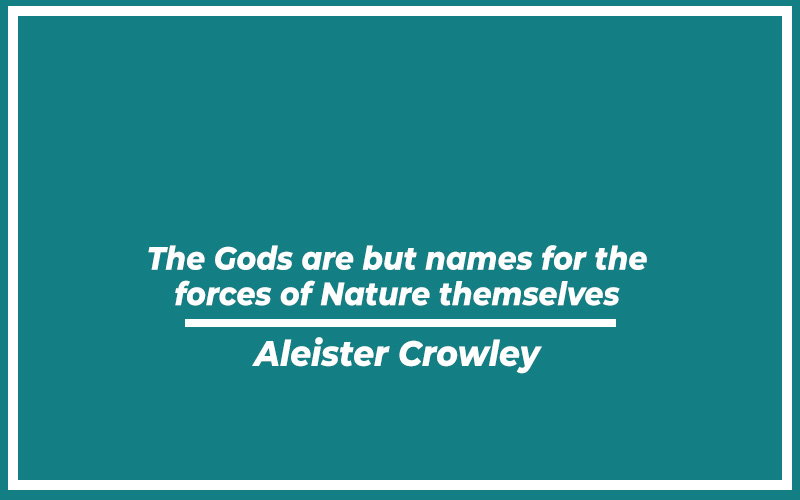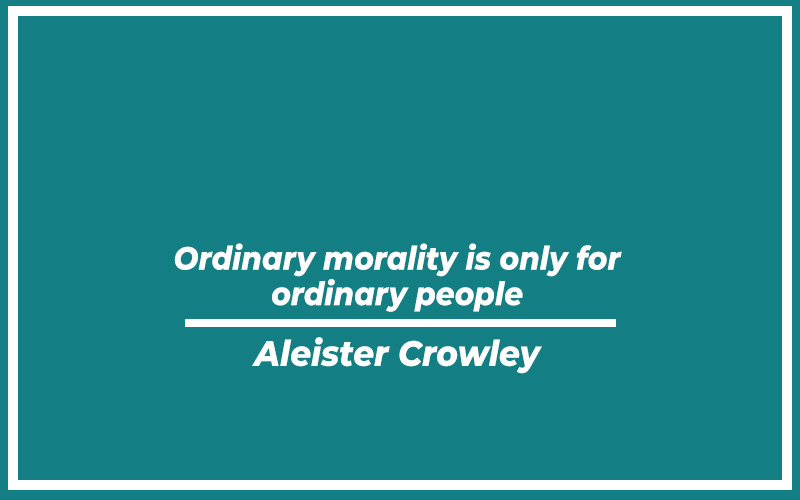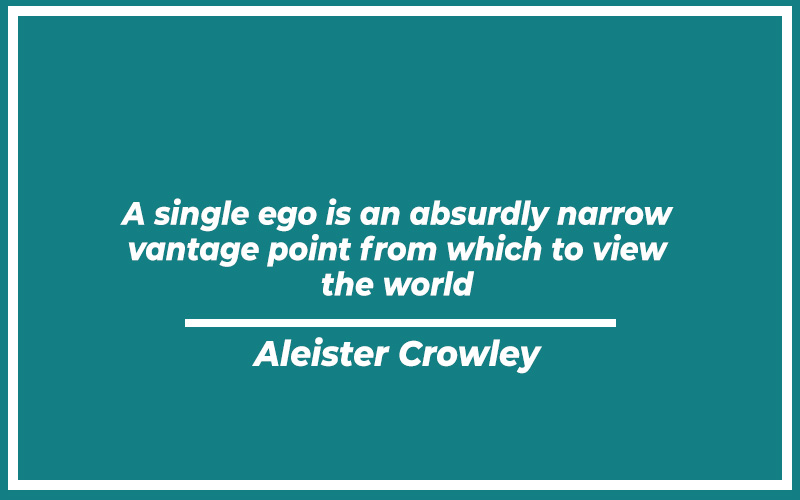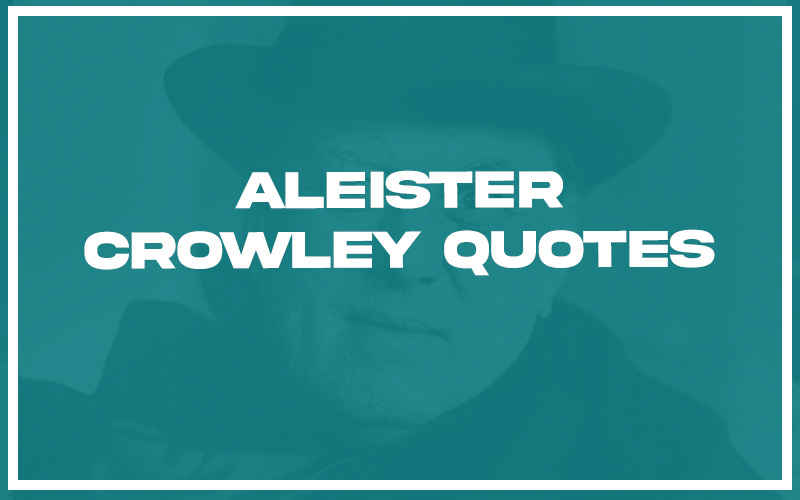Aleister Crowley was a controversial figure who left a lasting impact on the 20th century. A self-proclaimed mystic,magician, and poet, he challenged traditional religious beliefs and advocated for individual freedom.
His writings explored philosophy, occultism, and social commentary. While some people were fascinated by his work, some people also condemned him.
Aleister Crowley Quotes

“The Gods are but names for the forces of Nature themselves.” – Aleister Crowley
Crowley’s quote demystifies the concept of deities, suggesting that they are personifications of natural forces. This perspective aligns with his broader metaphysical views, where understanding and manipulating natural forces is central to magic.
By equating gods with nature, Crowley encourages a deeper connection with the natural world and its inherent powers, implying that reverence for nature and its processes is equivalent to reverence for the divine.
Also Read: Life is Precious Quotes (with Explanation)
“Light illuminates the path of humanity: it is our own fault if we go over the brink.” – Aleister Crowley
In this quote, Aleister Crowley emphasizes the guiding power of enlightenment and knowledge. He implies that humanity has the means to follow a path of understanding and progress, and that failure to do so is due to our own choices and actions.
This statement underscores the responsibility each individual bears in seeking truth and avoiding ignorance, advocating for a proactive pursuit of enlightenment to prevent personal and collective downfall.
“In the absence of will power, the most complete collection of virtues and talents is wholly worthless.” – Aleister Crowley
Crowley highlights the fundamental role of willpower in actualizing one’s potential. Without the drive and determination to apply them, virtues and talents remain unfulfilled.
This quote stresses the importance of cultivating inner strength and resolve, as these qualities enable individuals to harness their abilities and achieve their goals. Crowley’s philosophy places willpower at the core of personal development and success.
“Balance every thought with its opposition. Because the marriage of them is the destruction of illusion.” – Aleister Crowley
This quote advocates for a dialectical approach to thinking, where every idea is counterbalanced by its opposite. Crowley suggests that true understanding comes from reconciling opposing views, which dissolves illusions and reveals deeper truths.
This method encourages critical thinking and open-mindedness, urging individuals to consider multiple perspectives and embrace complexity in their quest for knowledge.
“To conquer life by living it to the full, and then we can go to meet death with a certain prestige.” – Aleister Crowley
Crowley’s perspective on life and death emphasizes living fully and embracing all experiences. By doing so, he believes one can approach death with dignity and a sense of accomplishment.
This philosophy encourages a fearless and wholehearted engagement with life, advocating for the pursuit of one’s passions and ambitions to the fullest extent. It frames death not as an end, but as a culmination of a life well-lived.
“There are no ‘standards of Right.’ Ethics is balderdash. Each Star must go on its own orbit. To hell with ‘moral principle’; there is no such thing.” – Aleister Crowley
Crowley’s radical stance on ethics challenges conventional moral standards, proposing that each individual must determine their own path. By dismissing universal moral principles, he emphasizes personal autonomy and subjective experience.
This quote reflects his belief in the fluidity and relativity of morality, urging individuals to find their own ethical compass rather than adhering to imposed norms.
“It is necessary that we stop, once for all, this ignorant meddling with other people’s business. Each individual must be left free to follow his own path.” – Aleister Crowley
Aleister Crowley’s emphasis on individual freedom resonates through this quote, challenging societal norms that often dictate conformity. Crowley viewed personal liberty as essential, not just in the physical sense but more profoundly within the spiritual and intellectual realms.
This perspective invites reflection on the importance of allowing individuals to explore and define their own beliefs and lifestyles without interference, highlighting a cornerstone of his philosophical teachings.
“Happiness lies within one’s self, and the way to dig it out is cocaine.” – Aleister Crowley
Crowley’s quote, albeit controversial, metaphorically suggests that true happiness resides within oneself, though he controversially points to cocaine as a means to uncover it. This reflects his broader view on the pursuit of personal enlightenment and fulfillment, albeit through unconventional and often criticized means.
The statement serves as a provocative reminder of Crowley’s philosophy that personal liberation and happiness are self-derived, urging an introspective journey, though his methods may not be universally accepted or advisable.
“Magic is real. And reality… it is magical.” – Aleister Crowley
This quote encapsulates Crowley’s view of magic and reality as intertwined, suggesting that the everyday world is imbued with magical qualities and that magic itself is a tangible part of existence.
It reflects his belief in a mystical underpinning to life, where the act of living itself is a magical experience. This perspective invites us to look beyond the mundane to appreciate the mystical aspects of the world around us.
“People think that talking is a sign of thinking. It isn’t, for the most part; on the contrary, it’s a mechanical dodge of the body to relieve oneself of the strain of thinking.” – Aleister Crowley
Here, Crowley critiques the common misconception that frequent talking is synonymous with thoughtful reflection. He suggests that talking can be a superficial act, used to avoid the deeper, more strenuous mental efforts required for genuine thought.
This quote calls for a more contemplative approach to communication, valuing silence and deeper reflection over idle chatter.
“What the eye doesn’t see, the heart doesn’t grieve over.” – Aleister Crowley
Crowley’s remark points to the human tendency to ignore what is not directly observed or experienced. This speaks to the broader theme of denial and ignorance, where people may choose not to seek deeper truths to avoid discomfort.
The quote challenges us to confront realities beyond our immediate perception, suggesting that awareness and confrontation are necessary for emotional and spiritual growth.
“Love is the law, love under will.” – Aleister Crowley
This famous dictum from Crowley’s Thelemic philosophy posits love as the fundamental law of the universe, but it emphasizes that this love must be directed by one’s true will.
It encapsulates his belief in the alignment of personal desire with universal law, suggesting that true will and love are interdependent and that following one’s true will is an act of love in itself.
“The joy of life consists in the exercise of one’s energies, continual growth, constant change, the enjoyment of every new experience. To stop means simply to die. The eternal mistake of mankind is to set up an attainable ideal.” – Aleister Crowley
Crowley here celebrates the dynamic nature of life, advocating for continual personal growth and the embrace of change and new experiences as essential to living fully.
He criticizes the tendency to adhere to fixed ideals, which he views as contrary to the fundamental nature of existence. This quote encourages a philosophy of perpetual evolution and openness to life’s infinite possibilities.

“Ordinary morality is only for ordinary people.” – Aleister Crowley
Crowley’s quote critiques traditional moral standards, suggesting they are not suited for everyone, particularly those who see beyond societal norms.
He implies that exceptional individuals should define their own ethics based on personal experience and insight rather than conforming to common moral judgments. This statement encourages a reflection on the relativity of morality and challenges the one-size-fits-all approach to ethical principles.
“Every intentional act is a magical act.” – Aleister Crowley
Here, Crowley elevates the significance of intention in daily actions, framing each deliberate act as magical. This perspective asserts that our conscious intentions infuse our actions with power and purpose, aligning with his broader views on will and magic.
It suggests that we are constantly participating in creating our reality through our choices and actions, emphasizing the profound impact of living deliberately.
“Sanity is a compromise.” – Aleister Crowley
Crowley’s observation on sanity being a compromise challenges the conventional understanding of mental health. He implies that true sanity may require accepting and integrating unconventional thoughts or behaviors rather than adhering strictly to societal norms.
This quote suggests a more fluid and personalized approach to mental health, where balance is achieved through acknowledging and negotiating one’s unique perspectives and experiences.
“The key of joy is disobedience.” – Aleister Crowley
This provocative statement by Crowley highlights the value he places on rebellion against authority or societal expectations as a source of joy. It suggests that true happiness and personal fulfillment derive from challenging norms and pursuing one’s own path, even at the risk of nonconformity.
Crowley’s philosophy here invites individuals to question and potentially defy rules that do not resonate with their true will.
“Every man and every woman is a star.” – Aleister Crowley
Crowley promotes the idea that every individual is unique and significant, akin to a star in the cosmos. This metaphor underscores his belief in the divine nature of every person and the importance of pursuing one’s true will.
It encourages an appreciation of individuality and personal destiny, urging everyone to shine in their unique way.
“I slept with faith and found a corpse in my arms on awakening; I drank and danced all night with doubt and found her a virgin in the morning.” – Aleister Crowley
This quote uses vivid imagery to compare faith and doubt, suggesting that faith may lead to disillusionment while doubt retains its purity and potential.
Crowley’s metaphorical language invites a deeper contemplation of the nature of belief and skepticism, emphasizing that questioning and uncertainty can lead to renewal and deeper understanding.
“To read a newspaper is to refrain from reading something worthwhile.” – Aleister Crowley
Crowley criticizes the content of newspapers, implying that they distract from more meaningful or enriching reading. This critique reflects his disdain for the superficial or mundane aspects of mass media, urging individuals to seek out more substantial and transformative knowledge.
It champions the pursuit of deeper intellectual and spiritual growth over staying updated with often fleeting news cycles.
“The more necessary anything appears to my mind, the most certain it is that I only assert a limitation.” – Aleister Crowley
Crowley’s quote challenges the perception that necessity is an absolute concept, suggesting instead that what we consider necessary often limits our thinking and potential actions.
He encourages a reevaluation of our perceived needs, proposing that true freedom comes from questioning and possibly overcoming these mental boundaries. This perspective invites individuals to expand their horizons beyond the constraints of conventional necessity.
“Do not imagine that art or anything else is other than high magic! – is a system of holy hieroglyph. The artist, the initiate, thus frames his mysteries.” – Aleister Crowley
Here, Crowley equates the creation of art to the practice of high magic, emphasizing that both are deeply symbolic and transformative activities. He views art as a sacred act that encodes deeper truths and mysteries, much like magical symbols do.
This quote invites us to consider art as a profound expression of human experience and a gateway to understanding larger cosmic truths.
“Further, an excess of legislation defeats its own ends. It makes the whole population criminals, and turns them all into police and police spies. The moral health of such a people is ruined forever; only revolution can save it.” – Aleister Crowley
Crowley criticizes overly restrictive laws, suggesting that they can corrupt society by criminalizing ordinary behavior and fostering a culture of surveillance and mistrust.
He advocates for a balance between order and freedom, warning that too much control can damage the moral fabric of society. This statement is a call to examine and potentially reform systems that oppress rather than uplift.
“The man who denounces life merely defines himself as the man who is unequal to it.” – Aleister Crowley
In this quote, Crowley points out that those who criticize life are often those who feel overwhelmed or defeated by it. He suggests that denunciation is a defense mechanism for those unable to engage fully with life’s challenges.
This observation encourages a more proactive and positive engagement with life, regardless of its difficulties.
“Every man and every woman is a star.” – Aleister Crowley
Crowley’s declaration that each individual is a “star” reinforces his belief in the unique and divine nature of every person.
This metaphor highlights the intrinsic value and potential within each individual to shine and exert influence in their own right, much like stars in the universe. It’s a call to recognize and cultivate one’s own unique qualities and destiny.

“A single ego is an absurdly narrow vantage point from which to view the world.” – Aleister Crowley
This quote emphasizes the limitations of a purely egocentric perspective. Crowley advocates for expanding one’s viewpoint beyond personal experiences and biases to embrace a broader, more inclusive understanding of reality.
He suggests that wisdom comes from acknowledging the diversity of perspectives and experiences that exist beyond one’s self.
“The technical developments of almost every form of wealth [e.g., oil, minerals] are the forebears of Big Business; and Big Business, directly or indirectly, is the immediate cause of War.” – Aleister Crowley
Crowley links technological advancement and the accumulation of wealth in industries like oil and minerals to the rise of powerful corporations, which he argues are a major catalyst for conflict.
This quote reflects his critical view of capitalism and industrialization’s role in promoting global unrest and war, urging a reassessment of how wealth and resources are managed and distributed globally.
Also Read: Rod Wave Quotes (with Explanation)
Final Thoughts
You might consider him a visionary; you might even describe him as a charlatan, it won’t change the fact that Aleister Crowley’s work gave people a taste of his philosophy that ranged from the self-empowering to the shocking.
So perhaps next time, have the courage to question the status quo and explore alternative ways of thinking, even if those ideas push boundaries.

